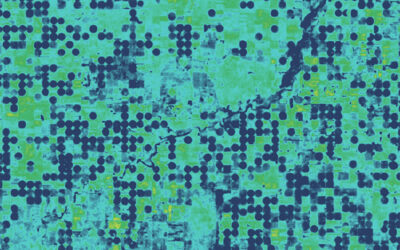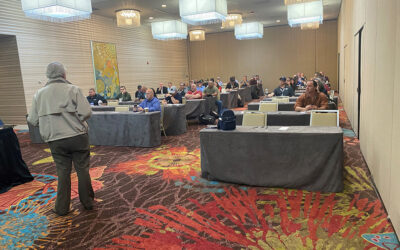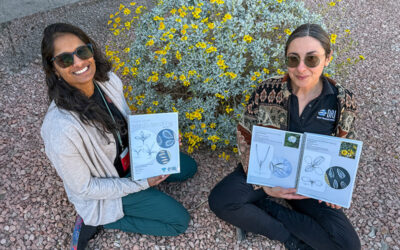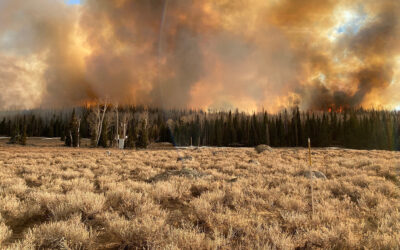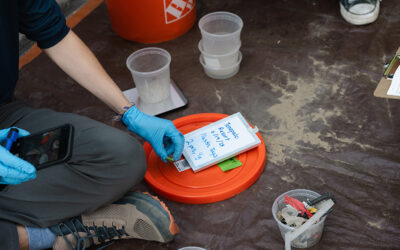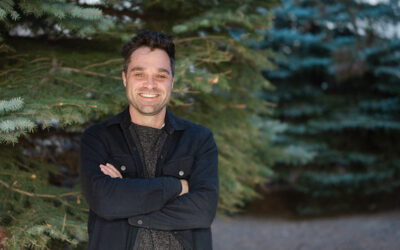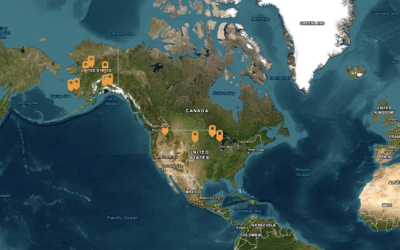OpenET, a nonprofit initiative focused on improving water management with accessible, satellite-based evapotranspiration (ET) data, has welcomed Sara Larsen as the new CEO. DRI sat down with Sara to discuss what makes the initiative unique, her plans for the organization, and how OpenET can help address the biggest challenges in water management.
DRI Scientists Work to Protect Miner Health and Safety Across Nevada
To help protect miners and assist mine managers in reducing hazardous exposures, DRI scientists Xiaoliang Wang, Judy Chow, and John Watson are conducting free trainings to raise awareness about health risks and effective protection methods. Data from the Mine Safety and Health Administration (MSHA) show that as much as 27% of miners are overexposed to air contaminants.
Tiffany Pereira Blends Art and Science in New Mojave Seedling Guide
The ecologist and illustrator created a first-of-its-kind seedling guide to help land managers and community members identify native plant seeds and aid with restoration work. DRI sat down with Pereira for more information about her goals and inspiration for the project, the benefits of fusing art with science, and the miracles contained in the tiniest seeds.
Meet Alexa Daniel
Alexa Daniel, M.Sc., is a hydrogeologist and Assistant Research Scientist who joined DRI this past December. Based at Reno’s campus, she will be spending most of her time over the next two years developing water resource plans for Nevada’s rural counties. In the following interview, Daniel shares her wide range of experience studying water resources in the West, her favorite book, and an invitation to a network event she’s spearheading for young professionals.
What We Know About Wildfire Risk and Prevention
DRI scientists conduct a wide range of research on wildfire related topics to help policymakers, fire managers, and community members navigate challenges to public safety and health. In this Q&A, a selection of our scientists answer some of the most pressing questions about the environmental conditions that lead to the most devastating blazes and offer previews into some of their most relevant research.
Volunteer Scientists Validate Rain and Snow Estimates
DRI scientists Guo Yu, Meghan Collins, Monica Arienzo, and Anne Heggli co-authored a new study that examines how Mountain Rain or Snow is helping improve weather forecasting models. The citizen science project collects observations of precipitation from community volunteers across the country to further scientific understanding of the environmental variables impacting where precipitation falls as either rain or snow. This information is critical for informing avalanche forecasting, road safety, and water resources management.
DRI Internships Offer Nevada Students Experience with Research and Insight into STEM Careers
This summer and fall, DRI brought twelve students from Nevada’s community and state colleges to the Las Vegas and Reno campuses for a paid, immersive research experience. Over the course of the 16-week program, students worked under the mentorship of DRI faculty members to learn about the process of using scientific research to solve real-world problems. This unique internship program welcomes all students, not only those pursuing majors in science, who are in their first or second year of enrollment at local state and community colleges.
Meet Patrick Hurbain
Patrick Hurbain, Ph.D., is an environmental epidemiologist working with Judy Chow, John Watson, and Xiaoliang Wang in the Environmental Analysis Facility. In the following interview, Hurbain discusses how his childhood in Stead influenced his career trajectory, his new study published in Environmental Science & Technology, and his hopes for bringing the chili cook-off back to DRI.
Meet Tyler Doane
Tyler Doane, Ph.D., started in May 2024 as Assistant Research Professor in the Division of Hydrologic Sciences. He works remotely from Cleveland, Ohio, where his wife teaches bioethics at Case Western Reserve University’s medical school. Doane is a geomorphologist who received his Ph.D. at Vanderbilt University before completing a postdoctoral position at Indiana University, Bloomington. In the this Behind the Science interview, Doane talks about his interest in applying math to describe scientific phenomena, his interest in embracing noise and chaos to understand Earth systems, and his favorite method for coming up with new research questions.
Native Climate Reporter Team Presents, Listens, and Learns at Indigenous Climate Conference in Alaska
Along Alaska’s western coastline, 400 miles from the nearest road system, villagers from the Indigenous community of Newtok were scheduled for permanent evacuation in mid-October due to the irreversible threat of rising seas. The story, recounted by Newtok resident Della Carl in September at the National Indigenous Climate Conference in Anchorage, Alaska, embedded itself deep in the hearts and minds of each member of the audience, making it clear not just that sea level rise is happening, but why it matters. Such is the power of a well-told story.
